Study Skills for Higher Education: CSR Report - LSC University Suffolk
VerifiedAdded on 2023/04/24
|10
|2414
|463
Report
AI Summary
This report focuses on the significance, role, and purpose of literature review (LR) in academic studies, utilizing Corporate Social Responsibility (CSR) as a case study. It demonstrates the ability to summarize and critically evaluate past research related to CSR. The report highlights the key functions of a literature review, including conveying core knowledge, organizing research contributions, identifying innovative interpretations, and demonstrating critical evaluation skills. It reviews literature on CSR, emphasizing its growing importance in theoretical and managerial discussions and its impact on stakeholder approaches and organizational benefits. The report concludes that CSR is essential for global firms, demonstrating an interest in broader social issues and attracting consumers, thus making good business sense for sustainable operations. Desklib provides access to similar reports and solved assignments for students.
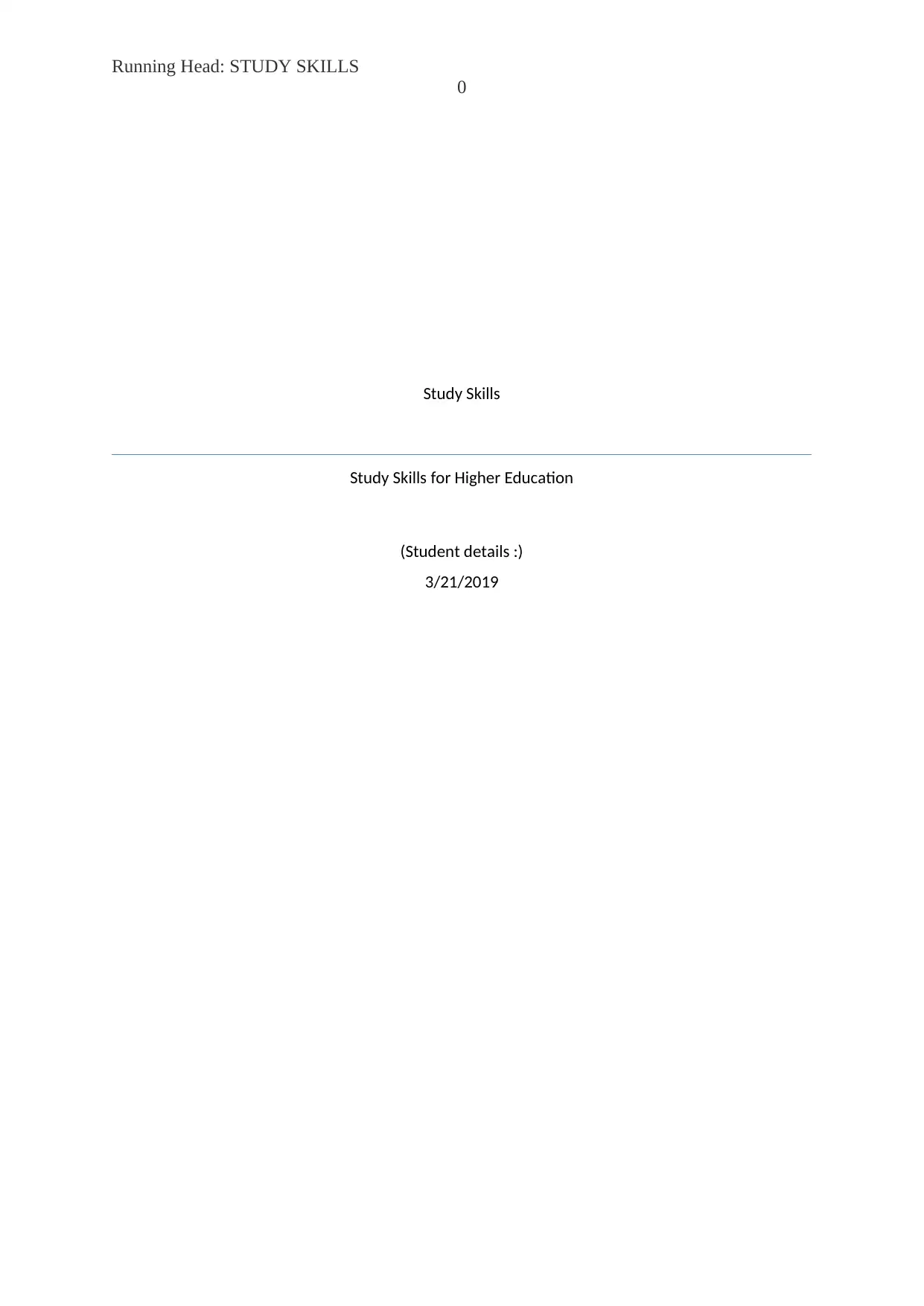
Running Head: STUDY SKILLS
0
Study Skills
Study Skills for Higher Education
(Student details :)
3/21/2019
0
Study Skills
Study Skills for Higher Education
(Student details :)
3/21/2019
Paraphrase This Document
Need a fresh take? Get an instant paraphrase of this document with our AI Paraphraser
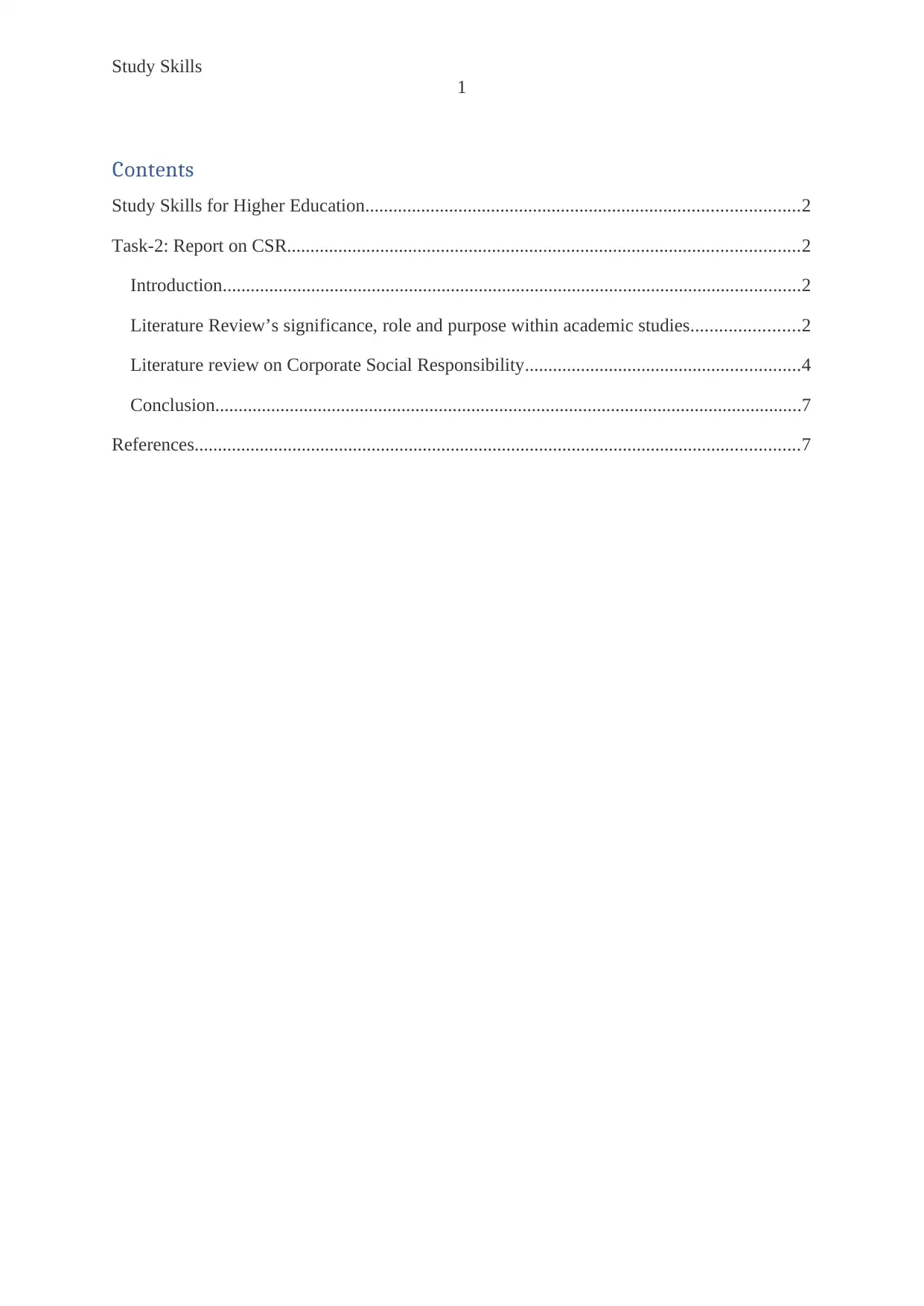
Study Skills
1
Contents
Study Skills for Higher Education.............................................................................................2
Task-2: Report on CSR..............................................................................................................2
Introduction............................................................................................................................2
Literature Review’s significance, role and purpose within academic studies.......................2
Literature review on Corporate Social Responsibility...........................................................4
Conclusion..............................................................................................................................7
References..................................................................................................................................7
1
Contents
Study Skills for Higher Education.............................................................................................2
Task-2: Report on CSR..............................................................................................................2
Introduction............................................................................................................................2
Literature Review’s significance, role and purpose within academic studies.......................2
Literature review on Corporate Social Responsibility...........................................................4
Conclusion..............................................................................................................................7
References..................................................................................................................................7
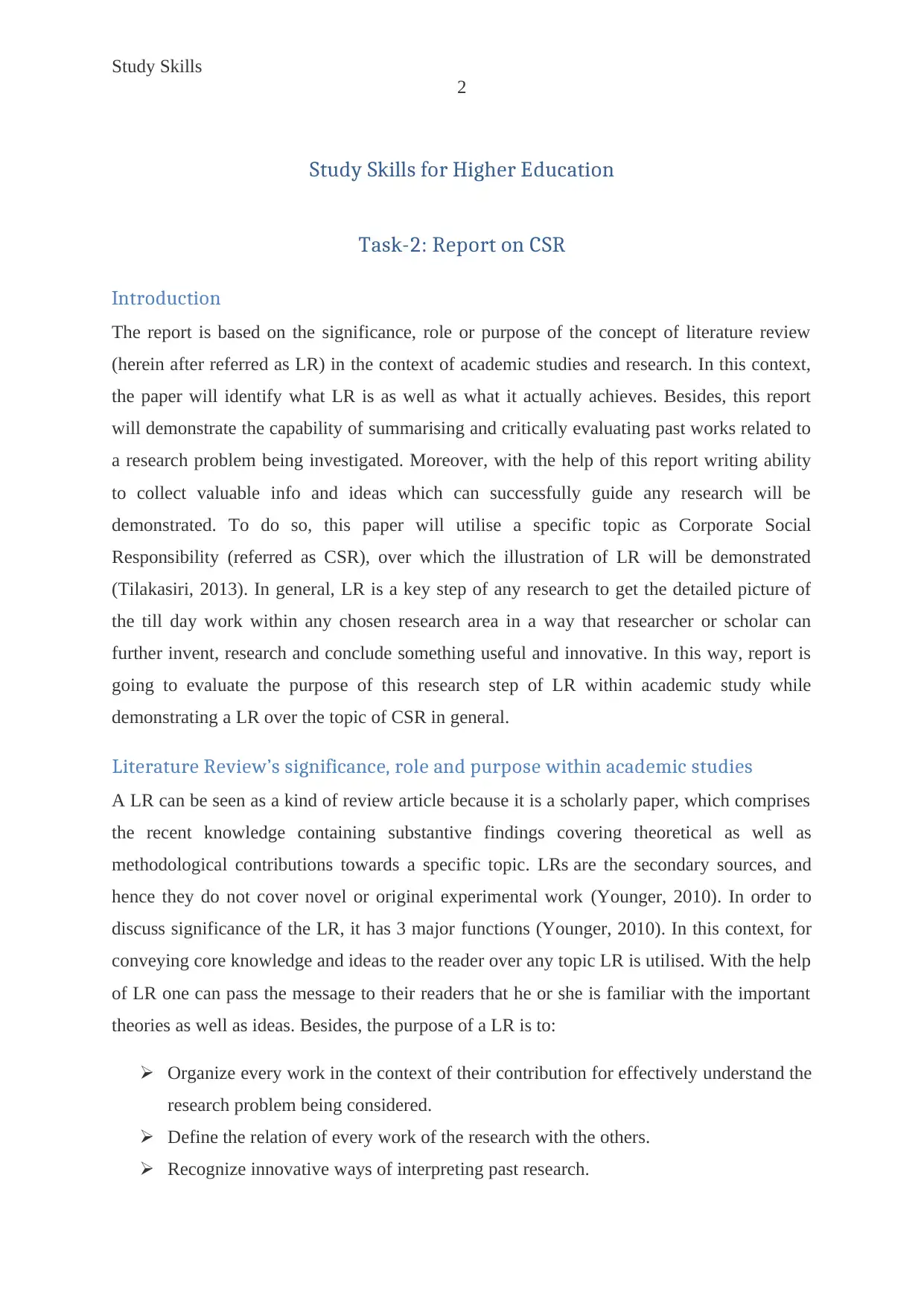
Study Skills
2
Study Skills for Higher Education
Task-2: Report on CSR
Introduction
The report is based on the significance, role or purpose of the concept of literature review
(herein after referred as LR) in the context of academic studies and research. In this context,
the paper will identify what LR is as well as what it actually achieves. Besides, this report
will demonstrate the capability of summarising and critically evaluating past works related to
a research problem being investigated. Moreover, with the help of this report writing ability
to collect valuable info and ideas which can successfully guide any research will be
demonstrated. To do so, this paper will utilise a specific topic as Corporate Social
Responsibility (referred as CSR), over which the illustration of LR will be demonstrated
(Tilakasiri, 2013). In general, LR is a key step of any research to get the detailed picture of
the till day work within any chosen research area in a way that researcher or scholar can
further invent, research and conclude something useful and innovative. In this way, report is
going to evaluate the purpose of this research step of LR within academic study while
demonstrating a LR over the topic of CSR in general.
Literature Review’s significance, role and purpose within academic studies
A LR can be seen as a kind of review article because it is a scholarly paper, which comprises
the recent knowledge containing substantive findings covering theoretical as well as
methodological contributions towards a specific topic. LRs are the secondary sources, and
hence they do not cover novel or original experimental work (Younger, 2010). In order to
discuss significance of the LR, it has 3 major functions (Younger, 2010). In this context, for
conveying core knowledge and ideas to the reader over any topic LR is utilised. With the help
of LR one can pass the message to their readers that he or she is familiar with the important
theories as well as ideas. Besides, the purpose of a LR is to:
Organize every work in the context of their contribution for effectively understand the
research problem being considered.
Define the relation of every work of the research with the others.
Recognize innovative ways of interpreting past research.
2
Study Skills for Higher Education
Task-2: Report on CSR
Introduction
The report is based on the significance, role or purpose of the concept of literature review
(herein after referred as LR) in the context of academic studies and research. In this context,
the paper will identify what LR is as well as what it actually achieves. Besides, this report
will demonstrate the capability of summarising and critically evaluating past works related to
a research problem being investigated. Moreover, with the help of this report writing ability
to collect valuable info and ideas which can successfully guide any research will be
demonstrated. To do so, this paper will utilise a specific topic as Corporate Social
Responsibility (referred as CSR), over which the illustration of LR will be demonstrated
(Tilakasiri, 2013). In general, LR is a key step of any research to get the detailed picture of
the till day work within any chosen research area in a way that researcher or scholar can
further invent, research and conclude something useful and innovative. In this way, report is
going to evaluate the purpose of this research step of LR within academic study while
demonstrating a LR over the topic of CSR in general.
Literature Review’s significance, role and purpose within academic studies
A LR can be seen as a kind of review article because it is a scholarly paper, which comprises
the recent knowledge containing substantive findings covering theoretical as well as
methodological contributions towards a specific topic. LRs are the secondary sources, and
hence they do not cover novel or original experimental work (Younger, 2010). In order to
discuss significance of the LR, it has 3 major functions (Younger, 2010). In this context, for
conveying core knowledge and ideas to the reader over any topic LR is utilised. With the help
of LR one can pass the message to their readers that he or she is familiar with the important
theories as well as ideas. Besides, the purpose of a LR is to:
Organize every work in the context of their contribution for effectively understand the
research problem being considered.
Define the relation of every work of the research with the others.
Recognize innovative ways of interpreting past research.
⊘ This is a preview!⊘
Do you want full access?
Subscribe today to unlock all pages.

Trusted by 1+ million students worldwide
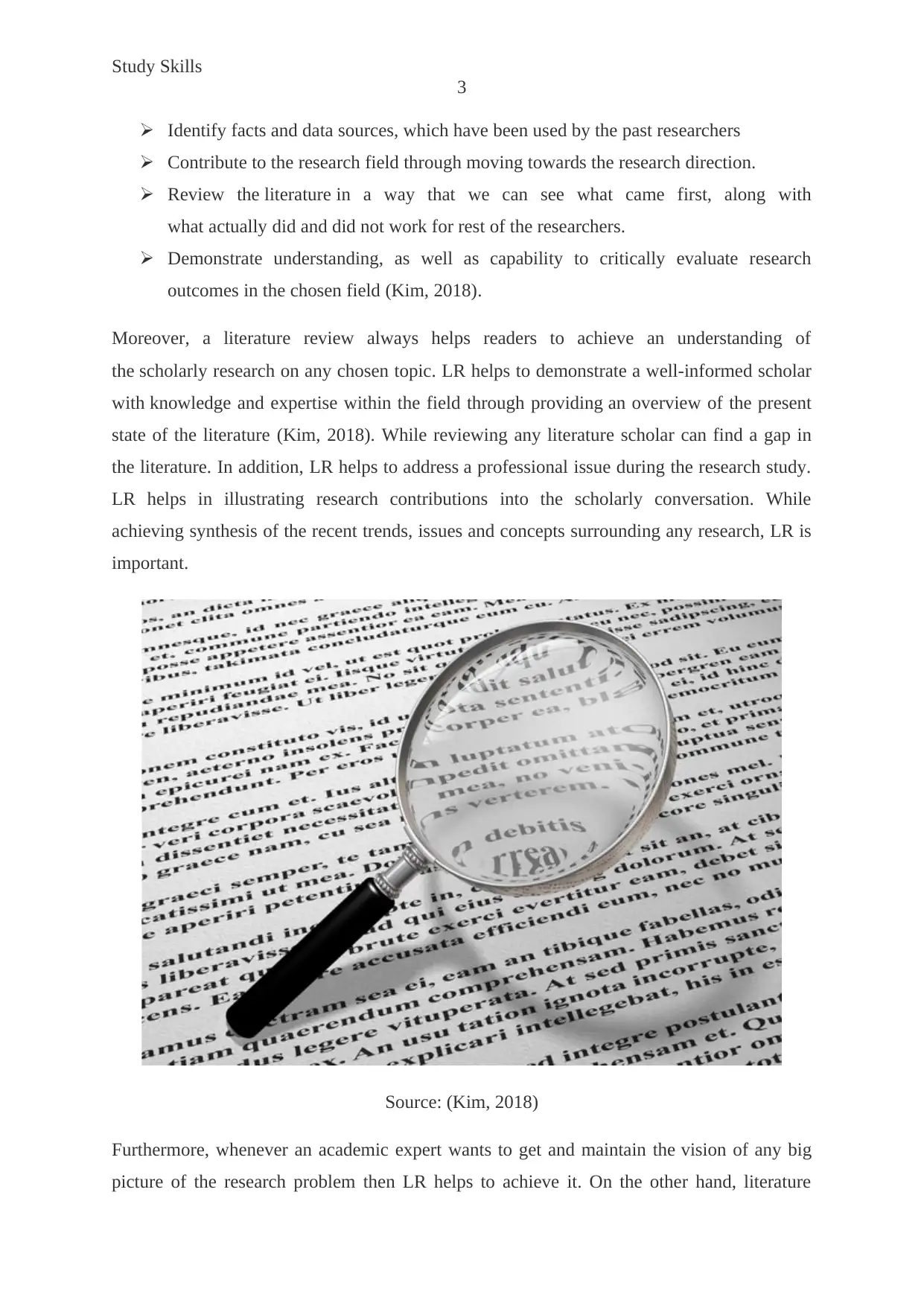
Study Skills
3
Identify facts and data sources, which have been used by the past researchers
Contribute to the research field through moving towards the research direction.
Review the literature in a way that we can see what came first, along with
what actually did and did not work for rest of the researchers.
Demonstrate understanding, as well as capability to critically evaluate research
outcomes in the chosen field (Kim, 2018).
Moreover, a literature review always helps readers to achieve an understanding of
the scholarly research on any chosen topic. LR helps to demonstrate a well-informed scholar
with knowledge and expertise within the field through providing an overview of the present
state of the literature (Kim, 2018). While reviewing any literature scholar can find a gap in
the literature. In addition, LR helps to address a professional issue during the research study.
LR helps in illustrating research contributions into the scholarly conversation. While
achieving synthesis of the recent trends, issues and concepts surrounding any research, LR is
important.
Source: (Kim, 2018)
Furthermore, whenever an academic expert wants to get and maintain the vision of any big
picture of the research problem then LR helps to achieve it. On the other hand, literature
3
Identify facts and data sources, which have been used by the past researchers
Contribute to the research field through moving towards the research direction.
Review the literature in a way that we can see what came first, along with
what actually did and did not work for rest of the researchers.
Demonstrate understanding, as well as capability to critically evaluate research
outcomes in the chosen field (Kim, 2018).
Moreover, a literature review always helps readers to achieve an understanding of
the scholarly research on any chosen topic. LR helps to demonstrate a well-informed scholar
with knowledge and expertise within the field through providing an overview of the present
state of the literature (Kim, 2018). While reviewing any literature scholar can find a gap in
the literature. In addition, LR helps to address a professional issue during the research study.
LR helps in illustrating research contributions into the scholarly conversation. While
achieving synthesis of the recent trends, issues and concepts surrounding any research, LR is
important.
Source: (Kim, 2018)
Furthermore, whenever an academic expert wants to get and maintain the vision of any big
picture of the research problem then LR helps to achieve it. On the other hand, literature
Paraphrase This Document
Need a fresh take? Get an instant paraphrase of this document with our AI Paraphraser
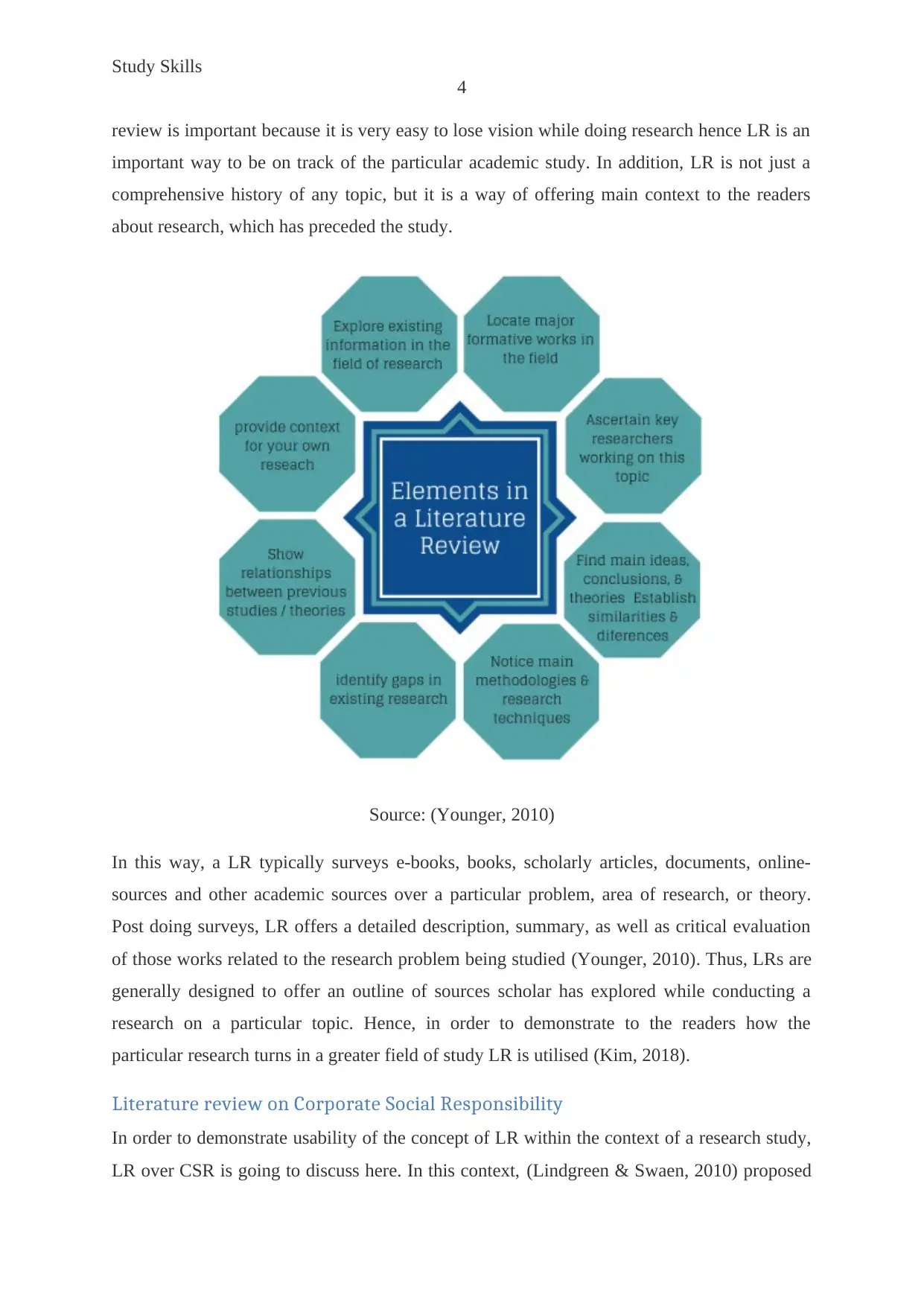
Study Skills
4
review is important because it is very easy to lose vision while doing research hence LR is an
important way to be on track of the particular academic study. In addition, LR is not just a
comprehensive history of any topic, but it is a way of offering main context to the readers
about research, which has preceded the study.
Source: (Younger, 2010)
In this way, a LR typically surveys e-books, books, scholarly articles, documents, online-
sources and other academic sources over a particular problem, area of research, or theory.
Post doing surveys, LR offers a detailed description, summary, as well as critical evaluation
of those works related to the research problem being studied (Younger, 2010). Thus, LRs are
generally designed to offer an outline of sources scholar has explored while conducting a
research on a particular topic. Hence, in order to demonstrate to the readers how the
particular research turns in a greater field of study LR is utilised (Kim, 2018).
Literature review on Corporate Social Responsibility
In order to demonstrate usability of the concept of LR within the context of a research study,
LR over CSR is going to discuss here. In this context, (Lindgreen & Swaen, 2010) proposed
4
review is important because it is very easy to lose vision while doing research hence LR is an
important way to be on track of the particular academic study. In addition, LR is not just a
comprehensive history of any topic, but it is a way of offering main context to the readers
about research, which has preceded the study.
Source: (Younger, 2010)
In this way, a LR typically surveys e-books, books, scholarly articles, documents, online-
sources and other academic sources over a particular problem, area of research, or theory.
Post doing surveys, LR offers a detailed description, summary, as well as critical evaluation
of those works related to the research problem being studied (Younger, 2010). Thus, LRs are
generally designed to offer an outline of sources scholar has explored while conducting a
research on a particular topic. Hence, in order to demonstrate to the readers how the
particular research turns in a greater field of study LR is utilised (Kim, 2018).
Literature review on Corporate Social Responsibility
In order to demonstrate usability of the concept of LR within the context of a research study,
LR over CSR is going to discuss here. In this context, (Lindgreen & Swaen, 2010) proposed
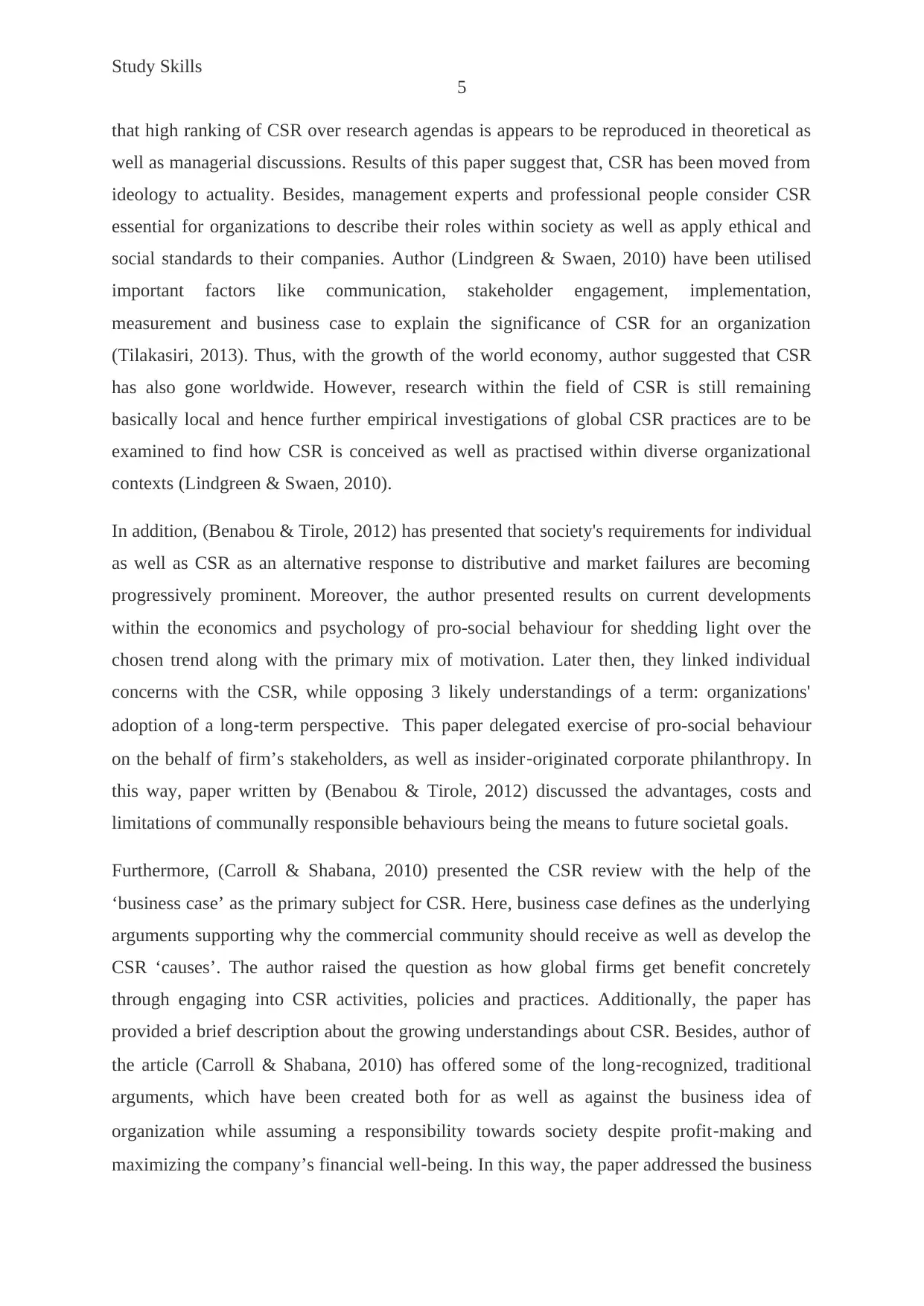
Study Skills
5
that high ranking of CSR over research agendas is appears to be reproduced in theoretical as
well as managerial discussions. Results of this paper suggest that, CSR has been moved from
ideology to actuality. Besides, management experts and professional people consider CSR
essential for organizations to describe their roles within society as well as apply ethical and
social standards to their companies. Author (Lindgreen & Swaen, 2010) have been utilised
important factors like communication, stakeholder engagement, implementation,
measurement and business case to explain the significance of CSR for an organization
(Tilakasiri, 2013). Thus, with the growth of the world economy, author suggested that CSR
has also gone worldwide. However, research within the field of CSR is still remaining
basically local and hence further empirical investigations of global CSR practices are to be
examined to find how CSR is conceived as well as practised within diverse organizational
contexts (Lindgreen & Swaen, 2010).
In addition, (Benabou & Tirole, 2012) has presented that society's requirements for individual
as well as CSR as an alternative response to distributive and market failures are becoming
progressively prominent. Moreover, the author presented results on current developments
within the economics and psychology of pro-social behaviour for shedding light over the
chosen trend along with the primary mix of motivation. Later then, they linked individual
concerns with the CSR, while opposing 3 likely understandings of a term: organizations'
adoption of a long‐term perspective. This paper delegated exercise of pro-social behaviour
on the behalf of firm’s stakeholders, as well as insider‐originated corporate philanthropy. In
this way, paper written by (Benabou & Tirole, 2012) discussed the advantages, costs and
limitations of communally responsible behaviours being the means to future societal goals.
Furthermore, (Carroll & Shabana, 2010) presented the CSR review with the help of the
‘business case’ as the primary subject for CSR. Here, business case defines as the underlying
arguments supporting why the commercial community should receive as well as develop the
CSR ‘causes’. The author raised the question as how global firms get benefit concretely
through engaging into CSR activities, policies and practices. Additionally, the paper has
provided a brief description about the growing understandings about CSR. Besides, author of
the article (Carroll & Shabana, 2010) has offered some of the long‐recognized, traditional
arguments, which have been created both for as well as against the business idea of
organization while assuming a responsibility towards society despite profit‐making and
maximizing the company’s financial well‐being. In this way, the paper addressed the business
5
that high ranking of CSR over research agendas is appears to be reproduced in theoretical as
well as managerial discussions. Results of this paper suggest that, CSR has been moved from
ideology to actuality. Besides, management experts and professional people consider CSR
essential for organizations to describe their roles within society as well as apply ethical and
social standards to their companies. Author (Lindgreen & Swaen, 2010) have been utilised
important factors like communication, stakeholder engagement, implementation,
measurement and business case to explain the significance of CSR for an organization
(Tilakasiri, 2013). Thus, with the growth of the world economy, author suggested that CSR
has also gone worldwide. However, research within the field of CSR is still remaining
basically local and hence further empirical investigations of global CSR practices are to be
examined to find how CSR is conceived as well as practised within diverse organizational
contexts (Lindgreen & Swaen, 2010).
In addition, (Benabou & Tirole, 2012) has presented that society's requirements for individual
as well as CSR as an alternative response to distributive and market failures are becoming
progressively prominent. Moreover, the author presented results on current developments
within the economics and psychology of pro-social behaviour for shedding light over the
chosen trend along with the primary mix of motivation. Later then, they linked individual
concerns with the CSR, while opposing 3 likely understandings of a term: organizations'
adoption of a long‐term perspective. This paper delegated exercise of pro-social behaviour
on the behalf of firm’s stakeholders, as well as insider‐originated corporate philanthropy. In
this way, paper written by (Benabou & Tirole, 2012) discussed the advantages, costs and
limitations of communally responsible behaviours being the means to future societal goals.
Furthermore, (Carroll & Shabana, 2010) presented the CSR review with the help of the
‘business case’ as the primary subject for CSR. Here, business case defines as the underlying
arguments supporting why the commercial community should receive as well as develop the
CSR ‘causes’. The author raised the question as how global firms get benefit concretely
through engaging into CSR activities, policies and practices. Additionally, the paper has
provided a brief description about the growing understandings about CSR. Besides, author of
the article (Carroll & Shabana, 2010) has offered some of the long‐recognized, traditional
arguments, which have been created both for as well as against the business idea of
organization while assuming a responsibility towards society despite profit‐making and
maximizing the company’s financial well‐being. In this way, the paper addressed the business
⊘ This is a preview!⊘
Do you want full access?
Subscribe today to unlock all pages.

Trusted by 1+ million students worldwide
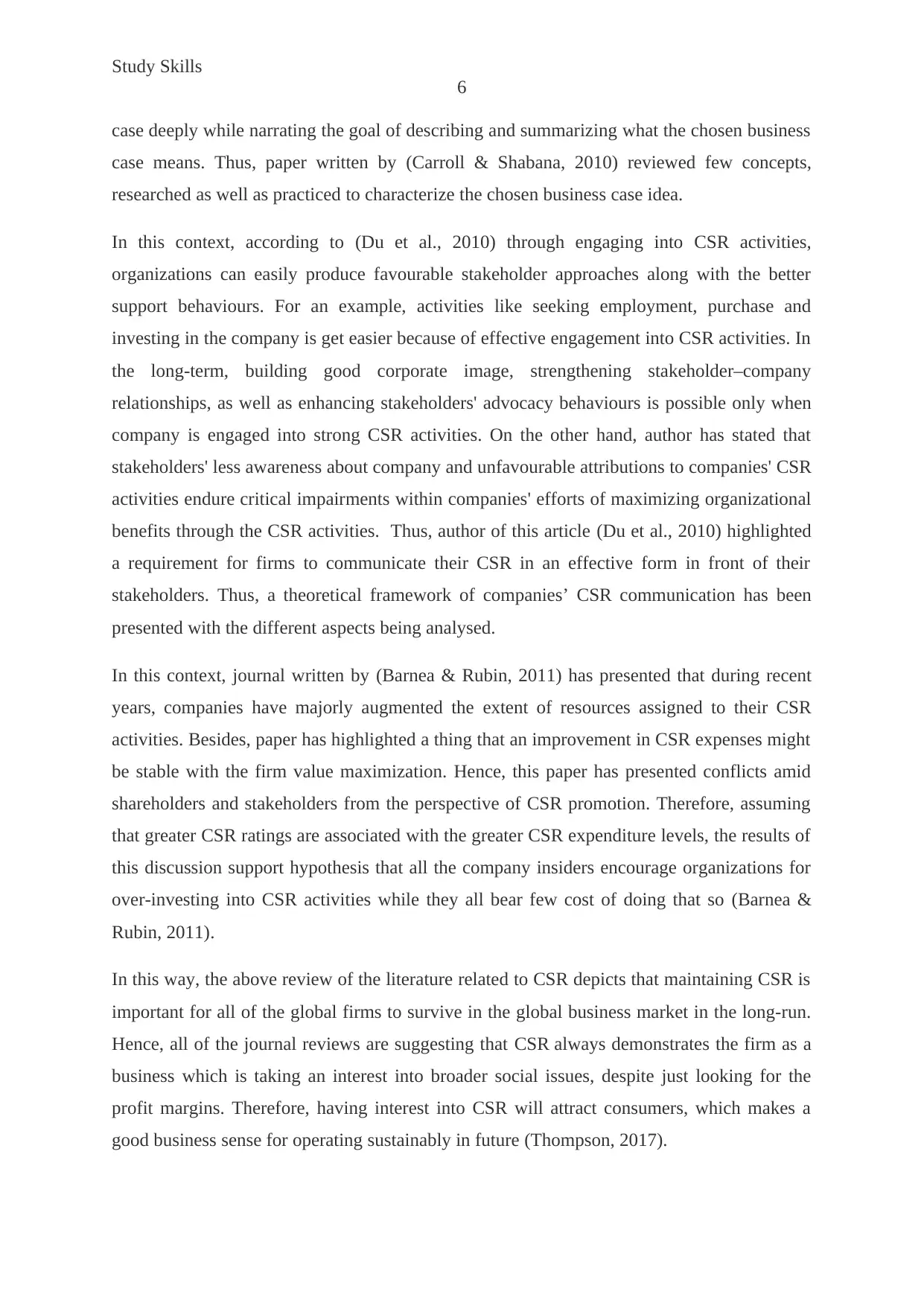
Study Skills
6
case deeply while narrating the goal of describing and summarizing what the chosen business
case means. Thus, paper written by (Carroll & Shabana, 2010) reviewed few concepts,
researched as well as practiced to characterize the chosen business case idea.
In this context, according to (Du et al., 2010) through engaging into CSR activities,
organizations can easily produce favourable stakeholder approaches along with the better
support behaviours. For an example, activities like seeking employment, purchase and
investing in the company is get easier because of effective engagement into CSR activities. In
the long-term, building good corporate image, strengthening stakeholder–company
relationships, as well as enhancing stakeholders' advocacy behaviours is possible only when
company is engaged into strong CSR activities. On the other hand, author has stated that
stakeholders' less awareness about company and unfavourable attributions to companies' CSR
activities endure critical impairments within companies' efforts of maximizing organizational
benefits through the CSR activities. Thus, author of this article (Du et al., 2010) highlighted
a requirement for firms to communicate their CSR in an effective form in front of their
stakeholders. Thus, a theoretical framework of companies’ CSR communication has been
presented with the different aspects being analysed.
In this context, journal written by (Barnea & Rubin, 2011) has presented that during recent
years, companies have majorly augmented the extent of resources assigned to their CSR
activities. Besides, paper has highlighted a thing that an improvement in CSR expenses might
be stable with the firm value maximization. Hence, this paper has presented conflicts amid
shareholders and stakeholders from the perspective of CSR promotion. Therefore, assuming
that greater CSR ratings are associated with the greater CSR expenditure levels, the results of
this discussion support hypothesis that all the company insiders encourage organizations for
over-investing into CSR activities while they all bear few cost of doing that so (Barnea &
Rubin, 2011).
In this way, the above review of the literature related to CSR depicts that maintaining CSR is
important for all of the global firms to survive in the global business market in the long-run.
Hence, all of the journal reviews are suggesting that CSR always demonstrates the firm as a
business which is taking an interest into broader social issues, despite just looking for the
profit margins. Therefore, having interest into CSR will attract consumers, which makes a
good business sense for operating sustainably in future (Thompson, 2017).
6
case deeply while narrating the goal of describing and summarizing what the chosen business
case means. Thus, paper written by (Carroll & Shabana, 2010) reviewed few concepts,
researched as well as practiced to characterize the chosen business case idea.
In this context, according to (Du et al., 2010) through engaging into CSR activities,
organizations can easily produce favourable stakeholder approaches along with the better
support behaviours. For an example, activities like seeking employment, purchase and
investing in the company is get easier because of effective engagement into CSR activities. In
the long-term, building good corporate image, strengthening stakeholder–company
relationships, as well as enhancing stakeholders' advocacy behaviours is possible only when
company is engaged into strong CSR activities. On the other hand, author has stated that
stakeholders' less awareness about company and unfavourable attributions to companies' CSR
activities endure critical impairments within companies' efforts of maximizing organizational
benefits through the CSR activities. Thus, author of this article (Du et al., 2010) highlighted
a requirement for firms to communicate their CSR in an effective form in front of their
stakeholders. Thus, a theoretical framework of companies’ CSR communication has been
presented with the different aspects being analysed.
In this context, journal written by (Barnea & Rubin, 2011) has presented that during recent
years, companies have majorly augmented the extent of resources assigned to their CSR
activities. Besides, paper has highlighted a thing that an improvement in CSR expenses might
be stable with the firm value maximization. Hence, this paper has presented conflicts amid
shareholders and stakeholders from the perspective of CSR promotion. Therefore, assuming
that greater CSR ratings are associated with the greater CSR expenditure levels, the results of
this discussion support hypothesis that all the company insiders encourage organizations for
over-investing into CSR activities while they all bear few cost of doing that so (Barnea &
Rubin, 2011).
In this way, the above review of the literature related to CSR depicts that maintaining CSR is
important for all of the global firms to survive in the global business market in the long-run.
Hence, all of the journal reviews are suggesting that CSR always demonstrates the firm as a
business which is taking an interest into broader social issues, despite just looking for the
profit margins. Therefore, having interest into CSR will attract consumers, which makes a
good business sense for operating sustainably in future (Thompson, 2017).
Paraphrase This Document
Need a fresh take? Get an instant paraphrase of this document with our AI Paraphraser
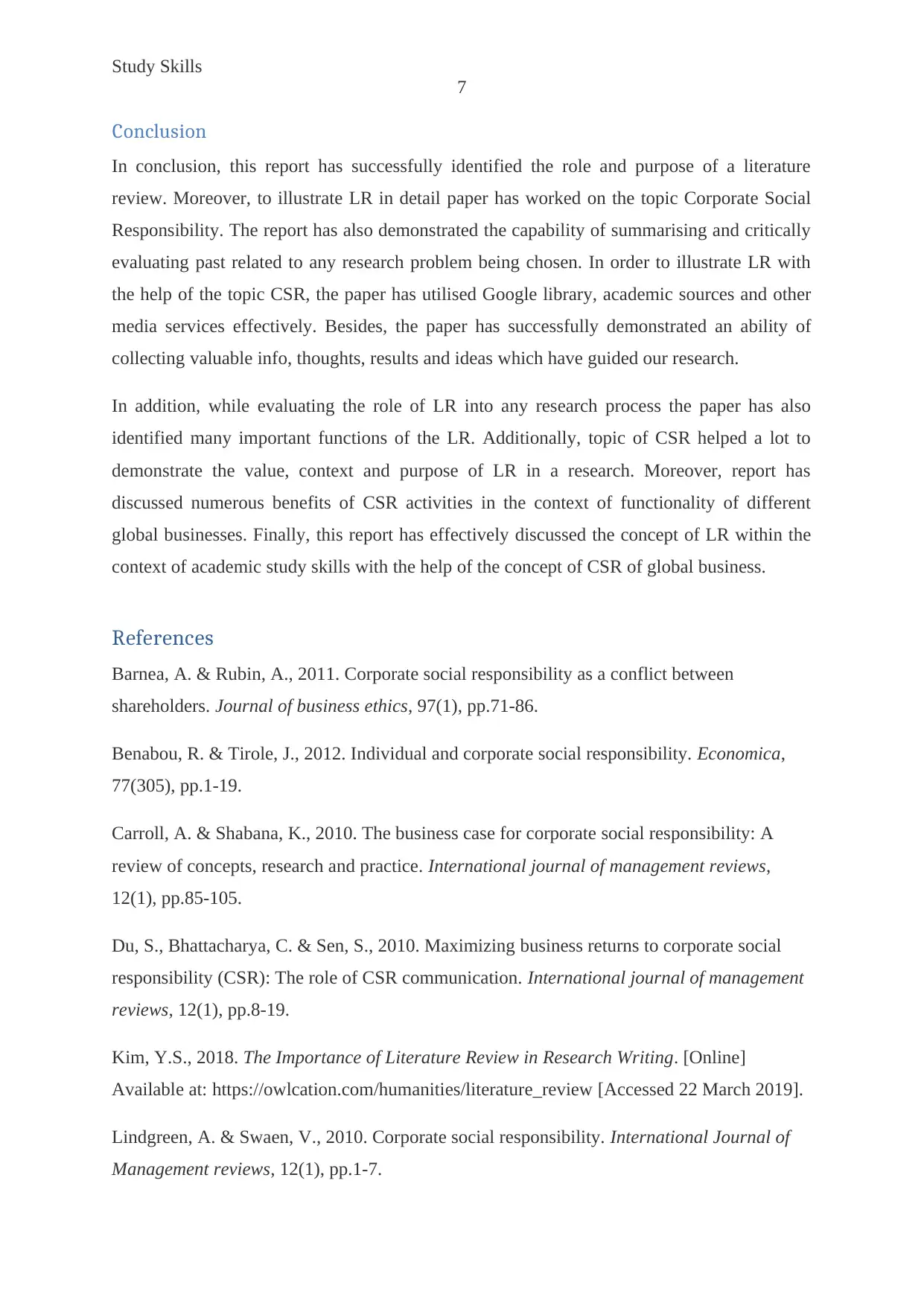
Study Skills
7
Conclusion
In conclusion, this report has successfully identified the role and purpose of a literature
review. Moreover, to illustrate LR in detail paper has worked on the topic Corporate Social
Responsibility. The report has also demonstrated the capability of summarising and critically
evaluating past related to any research problem being chosen. In order to illustrate LR with
the help of the topic CSR, the paper has utilised Google library, academic sources and other
media services effectively. Besides, the paper has successfully demonstrated an ability of
collecting valuable info, thoughts, results and ideas which have guided our research.
In addition, while evaluating the role of LR into any research process the paper has also
identified many important functions of the LR. Additionally, topic of CSR helped a lot to
demonstrate the value, context and purpose of LR in a research. Moreover, report has
discussed numerous benefits of CSR activities in the context of functionality of different
global businesses. Finally, this report has effectively discussed the concept of LR within the
context of academic study skills with the help of the concept of CSR of global business.
References
Barnea, A. & Rubin, A., 2011. Corporate social responsibility as a conflict between
shareholders. Journal of business ethics, 97(1), pp.71-86.
Benabou, R. & Tirole, J., 2012. Individual and corporate social responsibility. Economica,
77(305), pp.1-19.
Carroll, A. & Shabana, K., 2010. The business case for corporate social responsibility: A
review of concepts, research and practice. International journal of management reviews,
12(1), pp.85-105.
Du, S., Bhattacharya, C. & Sen, S., 2010. Maximizing business returns to corporate social
responsibility (CSR): The role of CSR communication. International journal of management
reviews, 12(1), pp.8-19.
Kim, Y.S., 2018. The Importance of Literature Review in Research Writing. [Online]
Available at: https://owlcation.com/humanities/literature_review [Accessed 22 March 2019].
Lindgreen, A. & Swaen, V., 2010. Corporate social responsibility. International Journal of
Management reviews, 12(1), pp.1-7.
7
Conclusion
In conclusion, this report has successfully identified the role and purpose of a literature
review. Moreover, to illustrate LR in detail paper has worked on the topic Corporate Social
Responsibility. The report has also demonstrated the capability of summarising and critically
evaluating past related to any research problem being chosen. In order to illustrate LR with
the help of the topic CSR, the paper has utilised Google library, academic sources and other
media services effectively. Besides, the paper has successfully demonstrated an ability of
collecting valuable info, thoughts, results and ideas which have guided our research.
In addition, while evaluating the role of LR into any research process the paper has also
identified many important functions of the LR. Additionally, topic of CSR helped a lot to
demonstrate the value, context and purpose of LR in a research. Moreover, report has
discussed numerous benefits of CSR activities in the context of functionality of different
global businesses. Finally, this report has effectively discussed the concept of LR within the
context of academic study skills with the help of the concept of CSR of global business.
References
Barnea, A. & Rubin, A., 2011. Corporate social responsibility as a conflict between
shareholders. Journal of business ethics, 97(1), pp.71-86.
Benabou, R. & Tirole, J., 2012. Individual and corporate social responsibility. Economica,
77(305), pp.1-19.
Carroll, A. & Shabana, K., 2010. The business case for corporate social responsibility: A
review of concepts, research and practice. International journal of management reviews,
12(1), pp.85-105.
Du, S., Bhattacharya, C. & Sen, S., 2010. Maximizing business returns to corporate social
responsibility (CSR): The role of CSR communication. International journal of management
reviews, 12(1), pp.8-19.
Kim, Y.S., 2018. The Importance of Literature Review in Research Writing. [Online]
Available at: https://owlcation.com/humanities/literature_review [Accessed 22 March 2019].
Lindgreen, A. & Swaen, V., 2010. Corporate social responsibility. International Journal of
Management reviews, 12(1), pp.1-7.
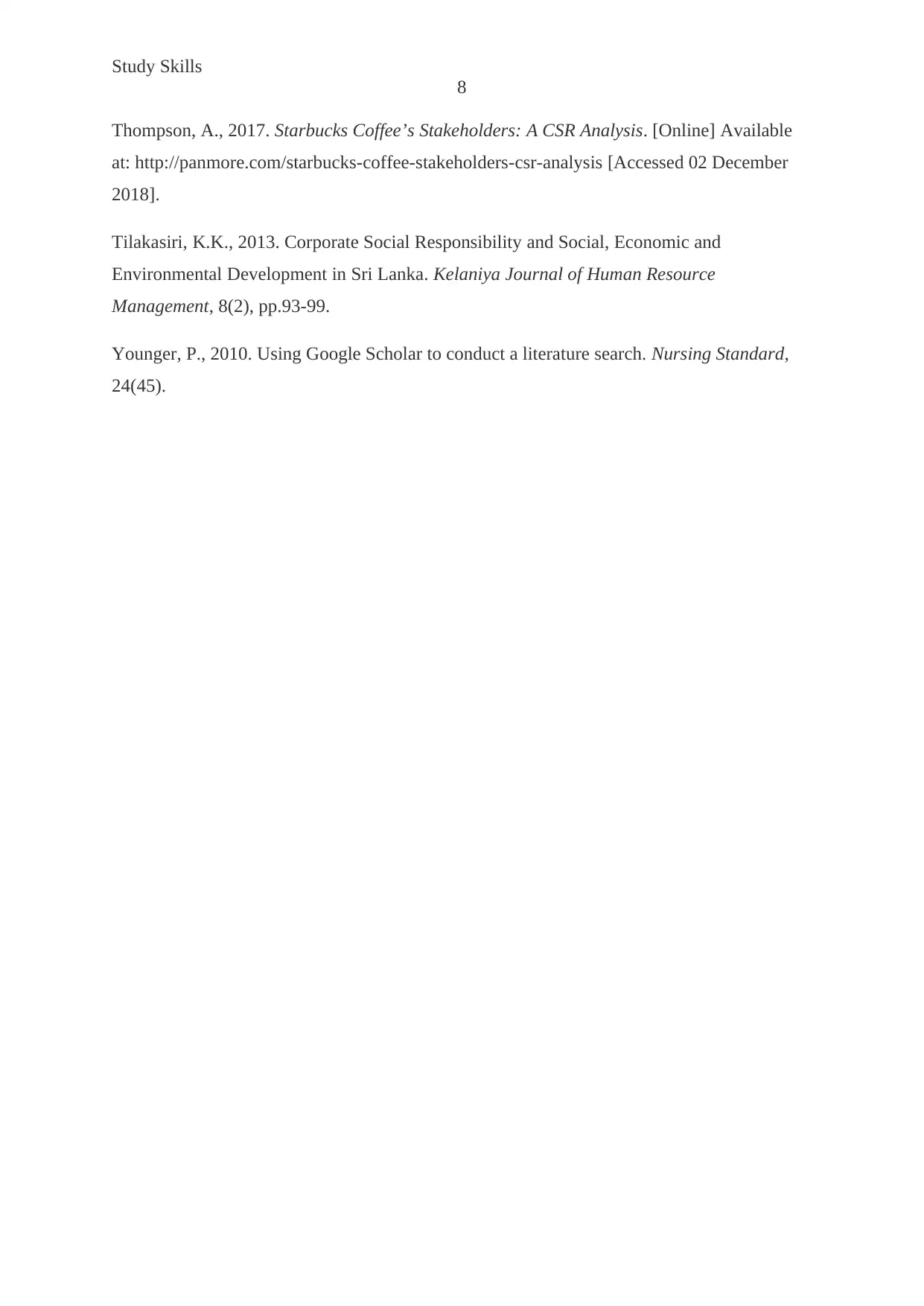
Study Skills
8
Thompson, A., 2017. Starbucks Coffee’s Stakeholders: A CSR Analysis. [Online] Available
at: http://panmore.com/starbucks-coffee-stakeholders-csr-analysis [Accessed 02 December
2018].
Tilakasiri, K.K., 2013. Corporate Social Responsibility and Social, Economic and
Environmental Development in Sri Lanka. Kelaniya Journal of Human Resource
Management, 8(2), pp.93-99.
Younger, P., 2010. Using Google Scholar to conduct a literature search. Nursing Standard,
24(45).
8
Thompson, A., 2017. Starbucks Coffee’s Stakeholders: A CSR Analysis. [Online] Available
at: http://panmore.com/starbucks-coffee-stakeholders-csr-analysis [Accessed 02 December
2018].
Tilakasiri, K.K., 2013. Corporate Social Responsibility and Social, Economic and
Environmental Development in Sri Lanka. Kelaniya Journal of Human Resource
Management, 8(2), pp.93-99.
Younger, P., 2010. Using Google Scholar to conduct a literature search. Nursing Standard,
24(45).
⊘ This is a preview!⊘
Do you want full access?
Subscribe today to unlock all pages.

Trusted by 1+ million students worldwide

Study Skills
9
9
1 out of 10
Related Documents
Your All-in-One AI-Powered Toolkit for Academic Success.
+13062052269
info@desklib.com
Available 24*7 on WhatsApp / Email
![[object Object]](/_next/static/media/star-bottom.7253800d.svg)
Unlock your academic potential
Copyright © 2020–2025 A2Z Services. All Rights Reserved. Developed and managed by ZUCOL.





